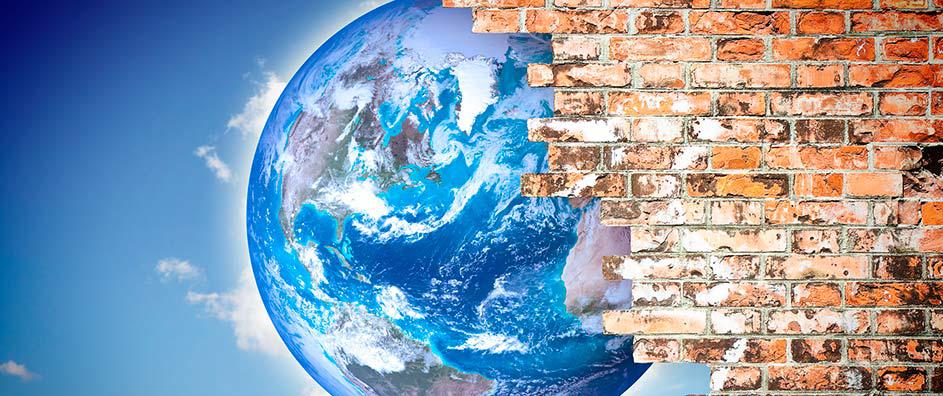In contemporary society, the notion of a crumbling world order resonates profoundly among various demographics, particularly within the Bahá’í community. This concept not only encapsulates the sociopolitical upheavals and existential crises prevalent in modern times but delves deeper into the spiritual and philosophical underpinnings that shape human experience. The Bahá’í teachings provide a rich tapestry of insights into the implications of these observations, suggesting that the dissolution of the old world order may herald a transformative phase in human evolution.
The phrase “crumbling old world order” serves as a metaphorical representation of systemic failures in existing structures, whether they be political, social, or economic. Its ubiquity in modern discourse is indicative of a collective consciousness grappling with uncertainty, disillusionment, and the desire for change. Yet, beneath this veneer of chaos lies an invitation to introspection and growth, beckoning individuals to reconsider their roles in a rapidly evolving world.
At the crux of Bahá’í philosophy is the principle of unity. The teachings advocate for the elimination of all forms of prejudice—be it racial, religious, or nationalistic—as a foundational step toward establishing a harmonious society. In contexts where old orders are disintegrating, this call for unity becomes particularly salient. The breakdown of divisive structures opens avenues for reconciliation, dialogue, and collaborative efforts aimed at fostering understanding among diverse communities.
Moreover, the Bahá’í teachings posit that the crumbling of societal constructs is not a mere happenstance; it is an integral part of the evolutionary arc of civilization. In this framework, crises are reframed as opportunities for rejuvenation and innovation. The old world order, characterized by competition and discord, gives way to a new paradigm rooted in cooperation and collective advancement.
Such a perspective invites an exploration of the role of individuals within this transformative journey. The Bahá’í writings emphasize the learning potential inherent in times of crisis. As traditional norms dissipate, individuals are compelled to reassess their values and beliefs, enabling them to adopt a more holistic worldview. This transition can be perceived not merely as a reaction to external changes but as a conscious choice to engage in the spiritual and ethical development necessary for nurturing societal progress.
Concurrently, the necessity for new systems of governance becomes pronounced. The collapse of the old order highlights the inadequacy of traditional power structures to address contemporary challenges. This recognition aligns with the Bahá’í principle of consultation, which advocates for inclusive decision-making processes that validate diverse perspectives. By establishing governance models grounded in spiritual principles, societies can cultivate environments wherein justice, equity, and well-being flourish.
In contemplating the fascination with the crumbling world order, one must acknowledge the epistemological paradigms through which individuals comprehend change. The allure of apocalyptic narratives often arises from an inherent human longing for clarity amid confusion. Such narratives, however, can be perilous. They may engender a sense of fatalism, detracting from the active pursuit of positive change. Bahá’í teachings emphasize that a transformative outlook is vital; thereby, individuals are encouraged to transcend mere observation and engage proactively in the reconstruction of societal frameworks.
Additionally, the international dimension of the Bahá’í teachings invites individuals to recognize that the repercussions of the crumbling world order are not confined to local contexts. Rather, they present a global phenomena, requiring a collective ethos. Understanding oneself as part of a larger community fosters a sense of responsibility and interconnectedness, essential traits for navigating change effectively. Here resides the Bahá’í commitment to the principle of global citizenship, emphasizing the need for collaborative engagement across borders to address shared challenges.
Furthermore, the spiritual ramifications of societal upheaval cannot be overlooked. Bahá’í philosophy asserts that individual and collective progress is contingent upon spiritual development. The crumbling of old paradigms necessitates a moral inventory, urging individuals to cultivate virtues such as patience, resilience, and compassion. In navigating the tumultuous waters of transformation, the nurturing of one’s inner life becomes paramount. This inner fortitude can inspire communities to rise collaboratively, thus enacting the very changes envisioned within Bahá’í teachings.
Lastly, it is incumbent upon the global Bahá’í community to demonstrate and embody the principles articulated in their teachings during these tumultuous times. By actively engaging in service, fostering dialogues, and cultivating inclusive spaces for discussion, Bahá’ís can act as catalysts for change. The implications of a crumbling world order, when understood through a Bahá’í lens, are neither dire nor insurmountable. Instead, they reveal pathways toward a renewed and revitalized civilization centered on unity, justice, and collective well-being.
In conclusion, the concept of a crumbling old world order encapsulates a range of observations and insights that resonate with the core tenets of Bahá’í teachings. The inevitability of change, the power of unity, and the value of spiritual and moral development are fundamental to navigating this transformative period. As individuals and communities grapple with these concepts, they are invited to engage actively in the reconstruction of societal frameworks, thus participating in the emergence of a new world—one that reflects the potential inherent in humanity’s collective journey.
